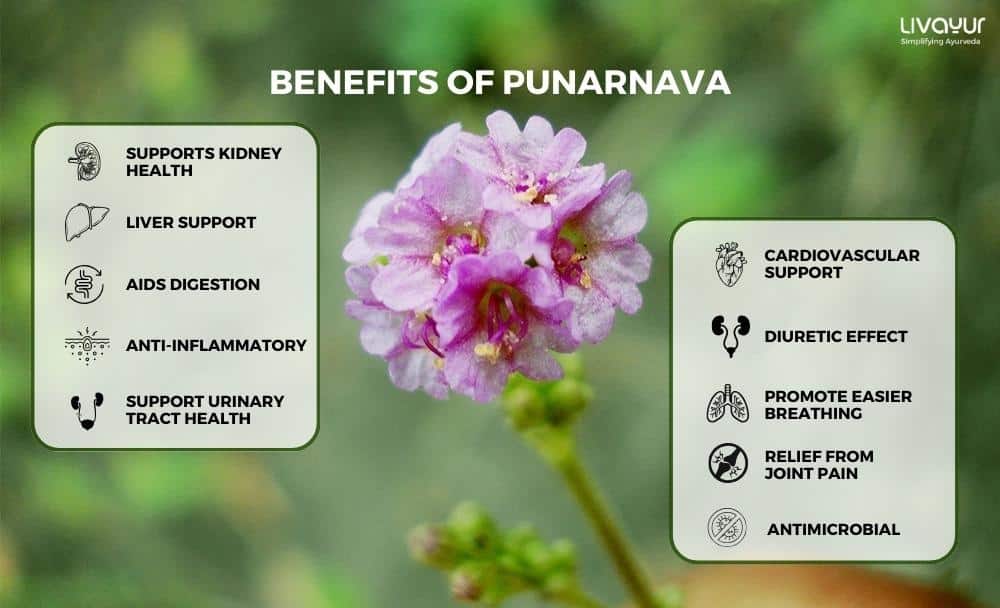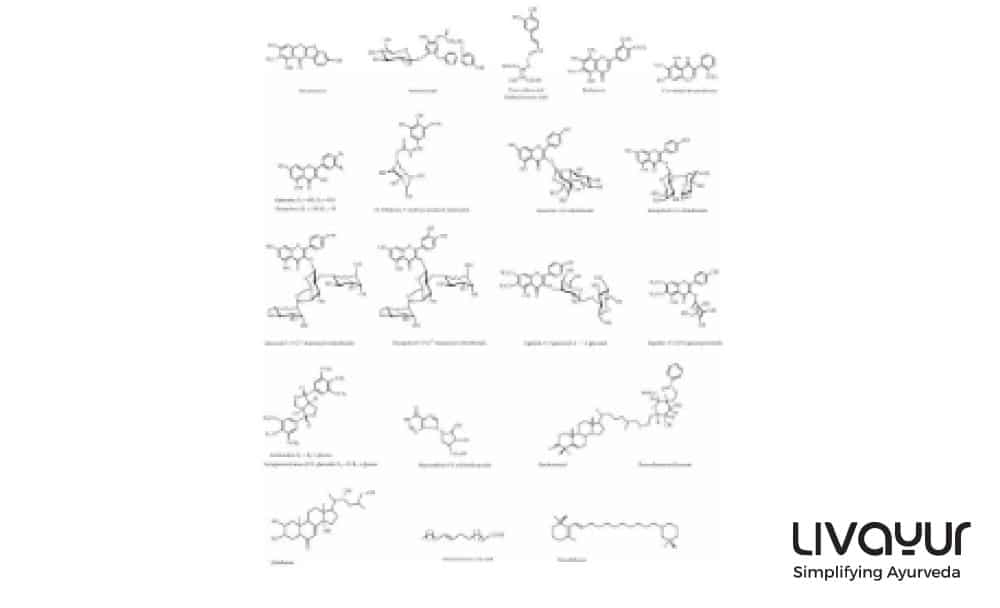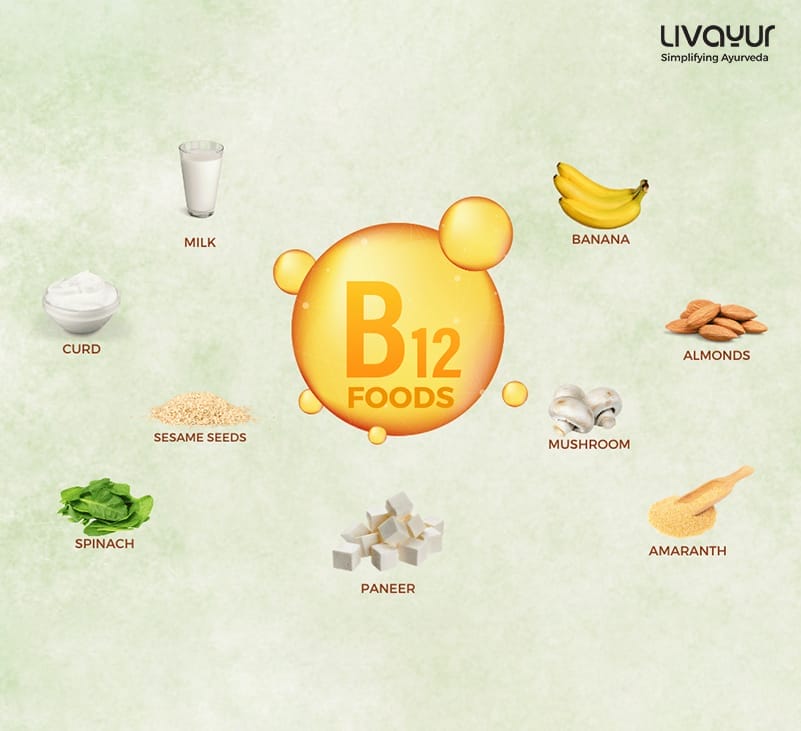
Have you heard of Punarnava, an Ayurvedic elixir for your kidneys? Punarnava herb, scientifically known as Boerhavia diffusa, is a medicinal plant with a rich history of use in Ayurvedic medicine. It offers various potential Punarnava health benefits and has been traditionally employed for its rejuvenating properties. The various phytochemicals in this wondrous herb makes it a famous herb in the realm of Ayurveda.
Given below is the chemical structure of some of its constituents

Source: Hindawi
In this article, we will explore the Punarnava benefits, Punarnava uses, and potential Punarnava side effects, focusing on each benefit and dividing it into primary and secondary effects. Read on to learn more:
Punarnava Benefits
1. Anti-inflammatory Properties
Primary Benefit: Punarnava exhibits potent anti-inflammatory properties, which can help alleviate inflammation in the body. The active compounds found in Punarnava have been shown to inhibit the production of pro-inflammatory molecules, potentially providing relief for conditions such as arthritis, asthma, and skin disorders.
Secondary Benefit: Punarnava’s anti-inflammatory properties may also contribute to improved joint health and reduced pain and swelling associated with inflammatory joint conditions. Additionally, it may support skin health by reducing redness, itching, and inflammation in skin conditions like eczema and psoriasis [1], [2]
2. Kidney Health Support
Primary Benefit: Punarnava benefits for kidney are many. Punarnava has diuretic properties that stimulate urine production and flow. This property aids in maintaining healthy kidney function by facilitating the elimination of waste products and toxins from the body. Punarnava’s diuretic effect may also be beneficial for managing conditions like urinary tract infections and kidney stones.
Secondary Benefit: By promoting healthy urine flow, Punarnava may help maintain optimal fluid balance in the body and support overall urinary system function. It may also assist in reducing oedema or water retention by facilitating the removal of excess fluid. [3]
3. Liver Support
Primary Benefit: Research suggests that Punarnava exhibits hepatoprotective effects, meaning it helps protect the liver from damage caused by toxins and oxidative stress. The plant compounds in Punarnava aid in detoxification processes and support liver health, contributing to overall well-being. The extensive range of Punarnava benefits for liver makes this herb stand out.
Secondary Benefit: Punarnava’s liver support may enhance liver function, leading to improved digestion, metabolism, and nutrient absorption. It may also assist in managing liver-related conditions such as fatty liver disease and hepatitis. [3]
4. Cardiovascular Health
Primary Benefit: Punarnava has potential cardiovascular health benefits. It may help maintain healthy blood pressure levels by promoting the dilation of blood vessels and supporting proper blood flow. The plant compounds in Punarnava may also exhibit antioxidant properties that protect against oxidative damage to the cardiovascular system.
Secondary Benefit: By supporting cardiovascular health, Punarnava may contribute to the overall well-being of the heart and blood vessels. It may help manage conditions such as hypertension, atherosclerosis, and heart disease [3].
5. Digestive Support
Primary Benefit: Punarnava has been traditionally used to support digestive health. It may stimulate digestive enzymes, improve appetite, and aid in the breakdown and absorption of nutrients. Punarnava’s digestive support properties can contribute to the optimal gastrointestinal function.
Secondary Benefit: By promoting healthy digestion, Punarnava may help alleviate digestive issues such as bloating, gas, and indigestion. It may also support bowel regularity and assist in managing conditions like constipation [1].
Common Punarnava Uses
1. Urinary Tract Infections
Punarnava is often used to support urinary tract health and manage urinary tract infections due to its diuretic and antimicrobial properties. [4]
2. Oedema and Water Retention
Punarnava’s diuretic effect is utilized to reduce oedema and address water retention issues [5].
3. Respiratory Conditions
Punarnava has been used in Ayurvedic medicine to alleviate respiratory conditions such as cough, asthma, and bronchitis. Its expectorant properties may help reduce congestion, clear mucus, and promote easier breathing [1], [2]
4. Joint Health
Punarnava is known for its anti-inflammatory properties, which may provide relief from joint pain, swelling, and stiffness associated with arthritis and rheumatic conditions. It may also support joint mobility and flexibility. [6]
Potential Punarnava Side Effects
1. Digestive Discomfort
Some individuals may experience mild digestive discomforts such as bloating, gas, or upset stomach when consuming Punarnava. It is recommended to start with a low dosage and consult a healthcare professional if any adverse digestive symptoms occur.
2. Drug Interactions
Punarnava may interact with certain medications, such as diuretics or antihypertensive drugs, due to its diuretic properties. If you are taking any medications, it is advisable to consult with a healthcare provider before incorporating Punarnava into your regimen.
3. Allergic Reactions
In rare cases, individuals may experience allergic reactions to Punarnava, especially if they have existing allergies to plants in the Nyctaginaceae family. If you develop symptoms such as rash, itching, or swelling, discontinue use and seek medical attention.It is important to note that while Punarnava offers potential Punarnava benefits for your health, individual responses may vary. It is always recommended to consult with a healthcare professional before incorporating Punarnava herb or any herbal supplement into your routine, especially if you have any underlying health conditions or are taking medications. Punarnava easy ayurveda information may not be adequate to learn in detail about this herb. So, in this comprehensive article, we have tried our best to give you a detailed picture about this herb.
FAQs
1. What are the various forms of Punarnava supplement?
Supplements of Punarnava are available in the form of Punarnava churna or powder, capsules, tablets, syrups, juice, and ksheer paks.
2. Can Punarnava leaves be used for eyes?
Yes, Punarnava leaves can be used for eyes. Juice extracted from the leaves of this herb may be mixed with honey and applied to the eyes to treat cataracts.
3. Can Punarnava herb help your skin in any way?
The Ropan properties of Punarnava extracts when applied to the skin may heal wounds fast and bring down skin inflammation. This is one of the most prominent Punarnava benefits for skin.
4. How to take Punarnava churna?
To make the most out of the Punarnava churna uses, mix the churna or powder with cow’s milk, and sweeten with honey. Take before meals.
5. Is the Punarnava herb heating or cooling for the body?
This herb has a heating impact on your body. Therefore, it is very effective in treating vitiated Kapha Dosha.
6. Why is Punarnava called a ‘weed’ sometimes?
As the herb can adjust to multiple growing environments, it is also often called a ‘weed’.
Conclusion
Punarnava, a versatile medicinal plant, has been used for various purposes in Ayurvedic medicine. Its diuretic, antimicrobial, anti-inflammatory, and other beneficial properties make it useful for urinary tract infections, oedema, liver disorders, respiratory conditions, and joint health. However, it is important to be aware of potential side effects and consult with a healthcare professional before using Punarnava. With proper guidance, Punarnava can be a valuable herbal remedy in supporting overall health and well-being.
Disclaimer:
This article is written solely from a health and lifestyle perspective.
References:
- Phytochemical, therapeutic, and ethnopharmacological overview for a traditionally important herb: Boerhavia diffusa Linn
- A clinical study of Punarnava Mandura in the management of Pandu Roga in old age (geriatric anemia)
- Traditional Indian Herbs Punarnava and Its Medicinal Importance
- Boerhaavia diffusa – A Wild Herb with Potent Biological and Antimicrobial Properties
- Ophthalmic uses of Boerhaavia Diffusa L. (Punarnava): Review
- Neutralization of Inflammation by Inhibiting In vitro and In vivo Secretory Phospholipase A2 by Ethanol Extract of Boerhaavia diffusa L.




















